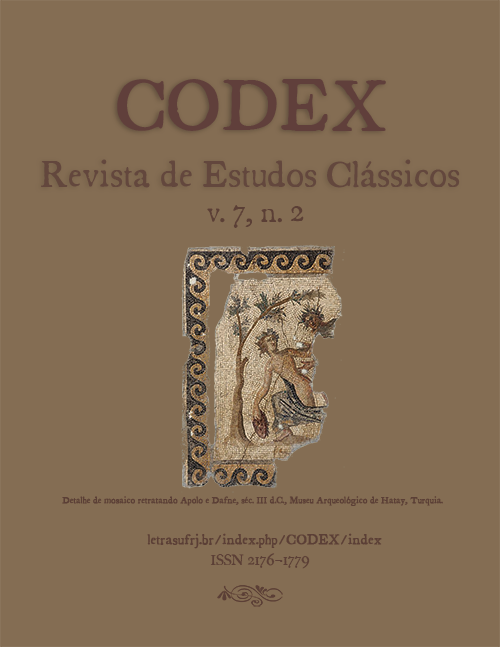Justice and Godliness in Euripides’ Suppliant Women
DOI:
https://doi.org/10.25187/codex.v7i2.30551Keywords:
Euripides, Suppliant Women, justice, godliness, Greek tragedyAbstract
Given that the matter of justice is the guiding thread of Euripidean tragedies and that the plot (understood as 'the combination of facts', sýnthesin tôn pragmáton, Aristotle, Poet.1450a4-5) is a diegetic image of the mythical notion of Justice, the part-by-part reading of the tragedy Suppliant Women by Euripides shows that - named or not - Justice, daughter of Zeus, manifests herself in the temporal horizon of the course of events, punishing transgressions and wickedness of mortals. If Justice is divine for being one of the fundamental aspects of the world, godliness lies in the decisions and attitudes of mortals, which make them grateful to the immortal Gods. The punishment of the Gods to mortals tends to be collective before being individual, whereas the grace of the Gods to mortals tends to be individual before being collective.References
EURIPIDES – Suppliant Women Electra Heracles. Edited and Translated by David Kovacs. Harvard University Press, 1998.
EURIPIDES – Suppliant Women, with Introduction, Translation and Commentary by James Morwood. Oxford, Aris & Phillips, 2007.
GRUBE, G. M. A. – The Drama of Euripides. London, Methuen, 1961.
STOREY, Ian C. – Euripides: Suppliant Women. London, Duckworth, 2008.
Downloads
Published
2019-12-31
How to Cite
Torrano, J. (2019). Justice and Godliness in Euripides’ Suppliant Women. CODEX - Revista De Estudos Clássicos, 7(2), 1–9. https://doi.org/10.25187/codex.v7i2.30551
Issue
Section
Articles
License
This work is licensed under a Creative Commons Attribution-NonCommercial 4.0 International License.










